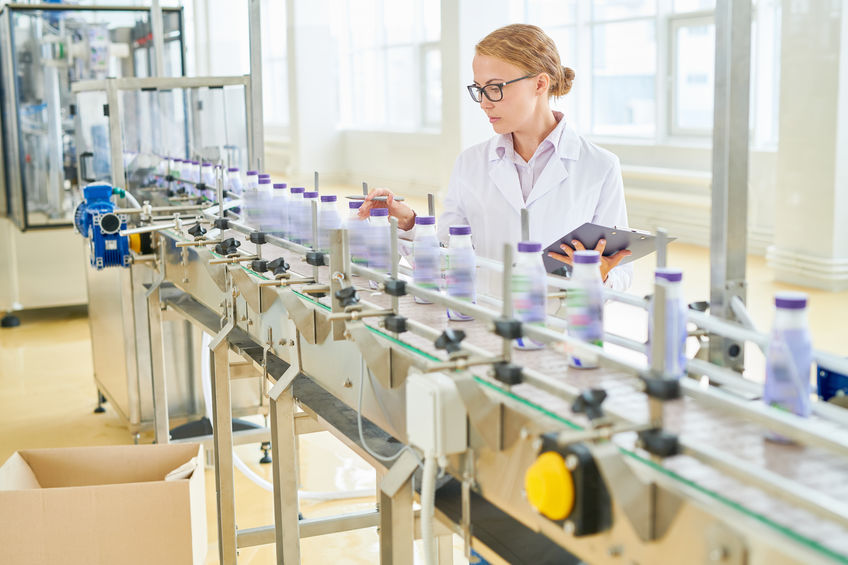A Guide to Industrial Automation Equipment Types
As labor shortages continue to plague industry and efforts to boost efficiency, improve quality and reduce costs expand, more manufacturers are considering the addition of automation products to bolster productivity and meet these goals. This blog aims to serve as a guide to the different types of automation and provide examples of various industrial automation applications.

The Benefits of Industrial Automation Equipment
Industrial automation involves the use of technology to manage or assist with manufacturing processes that were previously handled by manual laborers. As automation equipment technologies continue to advance and become more affordable and commonplace, more manufacturers and industrial facilities are employing various types of automation throughout their processes.
As a matter of fact, a study by Fortune Business Insights projects nearly 10% growth per year over the next 5 years. The study stated that the global industrial automation market size was valued at $205.86 billion in 2022 and is projected to reach $395.09 billion by 2029, exhibiting a CAGR of 9.8% during the forecast 2022-2029.
This notable growth is due in part to the many benefits provided by the introduction of automation products, including:
- Increased productivity: High speeds allow automation equipment to perform tasks more quickly and efficiently than human workers, which provides a significant boost to throughput and cycle times. Automation products can operate 24/7 without the need for breaks, sick time or vacation leave, further enhancing productivity. Often changeover times are reduced, as well, which reduces downtime.
- Improved quality: Because automation equipment is programmed to perform a task or sequence of tasks to exact specifications, automation products provide higher levels of accuracy than human workers. In addition, automation excels at repeatability, which means the task is managed in the same manner every time, eliminating instances of errors or variations introduced by human workers. These two factors support a boost in product quality.
- Fewer accidents: Automation equipment can safely be used in areas or operations that are hazardous for human workers, can easily lift, carry, move or maneuver heavy objects and can handle sharp or hazardous materials without risk of injury, which reduces instances of accidents and injuries to human workers, improving the safety record of the facility.
- Minimized costs: The installation of automation encourages cost savings by increasing efficiency, reducing waste associated with products that do not meet quality standards and minimizing costs associated with accidents and injuries in the plant.
Exploring the Four Types of Automation
With all the advantages associated with automation equipment, manufacturers are anxious to begin their automation journey, but may not understand the various technologies that are available to them or the industrial automation applications for which they can be used.
Here, we will explore the four main types of automation, as well as automation examples for each type.
Fixed Automation Equipment
In fixed automation, equipment is set up to permanently perform a specific operation and will repeat the task over and over again. Fixed automation is used to produce high volumes of product very quickly, making it suitable for operations that require a high degree of efficiency and consistency, but not much variation. Examples of industrial automation applications for fixed automation may include picking up a box and loading it onto a conveyor or an automated assembly machine.
Programmable Automation Products
While fixed automation is simple, programmable automation is more complex as this type of automation equipment can be programmed to perform a variety or sequence of tasks in batch production situations to more easily facilitate a changeover of products. Programmable automation is suitable for applications that require frequent changeovers and those that demand high levels of accuracy, repeatability or consistency for programmed tasks. Programmable automation examples include a collaborative robot that can be reprogrammed to dispense different ingredients or amounts of ingredients as recipes change or seasonal product lines are introduced.
Flexible Automation Equipment
Flexible automation equipment can be programmed not only to perform a variety of tasks, but can also be adjusted to change the way those operations are performed. Flexible automation is versatile so excels in lower volume production of a variety of products. Examples of industrial automation applications for flexible automation products include CNC machines and injection molding machines, which may be reprogrammed to handle a variety of products and instructions.
Integrated Automation Systems
As the most complex type of automation equipment, integrated automation systems involve the use of a group of machines that are connected to and operated by a central control system, allowing operators to control all parts of the production process from a single location. Integrated industrial automation and robots are often used in industries where products are produced in small batches, where changes to production must be made quickly and easily or where processes must be tightly controlled, such as those in food and beverage processing, fine chemical production or pharmaceutical manufacturing.
Selecting Industrial Automation Equipment
Because there are so many needs within the manufacturing industry there are many different types of automation to suit every demand, but choosing industrial automation and robotics can be complex. Often, the type of automation that will work best will depend on the specific needs of the facility in which it is placed or the product that it will be used to produce. For assistance as you begin the automation journey, please reach out to the experts at JHFOSTER, as they can help narrow down the choices so you can find the best type of automation for achieving your manufacturing goals.
